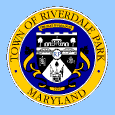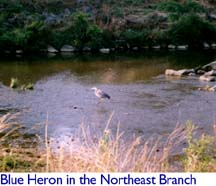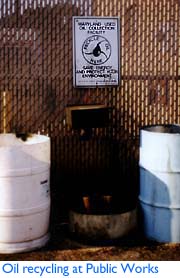
|
Global Navigation Links
Local Navigation Links
|

Ecological sustainability and the protection of Riverdale Park's natural environment are guiding principles of our vision. We see the environment as a whole where air and water quality as well as the health of plants and animals are keys to Riverdale Park's ecological viability. Informed residents and a proactive town government can contribute to the sustainability of our natural surroundings through initiatives such as waste management, energy conservation, tree plantings, stream restoration and traffic reduction. Small open spaces where adults and children can gather, large open space that provides relief from urban congestion, and a commitment to expand and protect these community resources will improve the quality of life in our town. Ultimately, our vision of Riverdale Park is one where humans live in harmony with the environment.
Environmental planning and leadership are essential to the long range effort to improve our quality of life. Education, community involvement, a coherent legal framework, and the allocation of town resources are the cornerstones of this planning and leadership.
The children of Riverdale Park represent its future. Children are receptive to new ways of viewing their surroundings and their place within the environment. School programs, the Riverdale Park Nature Club, local church initiatives, and scout troop projects all are potential avenues for demonstrating environmental sustainability. At the same time, adults can enhance their awareness of environmental issues through the Town Crier, other local and regional newspapers, interactions with other communities and organizations, and simple conversations with neighbors. Ultimately, we envision that an improved quality of life will flow from informed voluntary action.
The Northeast Branch of the Anacostia River and local streams play a vital role both as focal points for Riverdale Park's open space and as indicators of environmental health. Modification to the land, construction of storm drains, channeling streams, and major flood control projects have heavily affected Riverdale Park's natural stream system. The traditional flood control approach to maintaining these resources creates a heavy financial burden. We will work to preserve and recover the natural beauty and ecological value of our local streams. Riverdale will coordinate with neighboring communities that share flood control benefits and work with federal, state and county agencies to restore the Anacostia watershed. Finally, preservation and restoration of water quality will be important factors when the town evaluates development or redevelopment proposals.
Air quality has a direct impact on the health of town residents. Polluted air, especially in the summer months, is due in large part to excessive automobile traffic. In addition, heavy traffic increases the number of accidents, creates noise pollution, and increases the need for pavement. We envision a town where residents use environmentally friendly forms of transportation. Town residents will be able to reach local destinations using expanded public transit opportunities, bicycle lanes and green space connected by pedestrian trails. Not only will this lessen reliance on the automobile, it will benefit the local business community.
Many environmental problems stem from the energy sources we use; therefore, Riverdale Park should be a leader in adopting renewable and efficient energy technologies. Among the innovative changes that the town should investigate making is the wider use of solar energy and alternative fuels for transportation. Simple solutions to modern problems often give the best results. For example, neighborhoods with economic cores provide an energy-efficient alternative to using cars for shopping. Planting trees, improving thermal insulation in older buildings and encouraging energy efficient new construction will also reduce energy consumption in a very cost effective manner.

Managing solid waste in a financially and environmentally sustainable manner is another key part of our vision. As residents become more aware of the impact of their consumer habits through participation in waste management programs, they will become more inclined to reduce consumption, reuse what previously might have been simply discarded, and recycle the remainder. Reducing solid waste will lower town expenses for handling and disposal. In addition, composting yard wastes will reduce costs paid by residents for fertilizers and mulch. Recycling of newsprint, glass, metal, plastic and mixed paper will not only help reuse finite resources, it will reduce the town's dumping fees.
Riverdale Park now enjoys the benefits of mature trees that provide shade, reduce the impact of rainfall on the ground, stabilize soil from erosion, and provide a habitat for songbirds and squirrels. The town and residents of Riverdale Park will maintain and augment the existing tree canopy through additional plantings and replacement of dead and dying trees. Tree plantings on both town and private property will be good tools for involving local residents in improving their community and the environment. Riverdale Park's open space is an important resource that contributes to the quality of life in the town. Small parks and strips of unused land provide space for neighbors to meet and children to play. The town will acquire suitable properties for use as neighborhood parks and picnic areas. Other small open spaces such as those adjacent to public rights-of-way will be appropriate sites for community beautification projects undertaken by residents. Large open spaces provide opportunities to observe Riverdale Park's flora and fauna and are the repository for large stands of mature trees. The town will build and maintain relationships with owners of large tracts to ensure that development avoids damage to existing treescapes and natural habitats. The town will purchase or obtain easements that preserve these lands in their undeveloped state.
This page was last changed on Monday, July 5, 1999. Questions, comments, or submissions? See the Website Committee web page. This page has been accessed [an error occurred while processing this directive] times.
